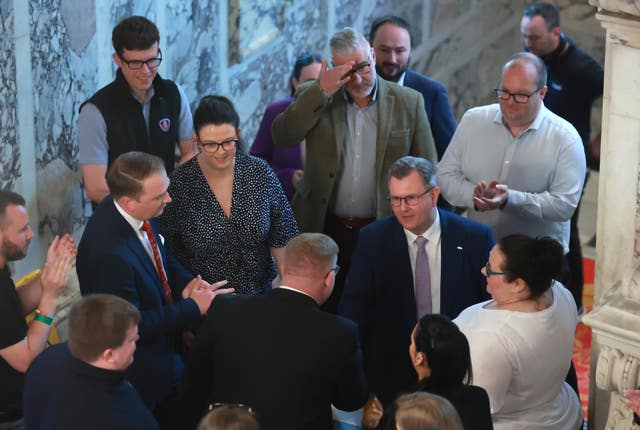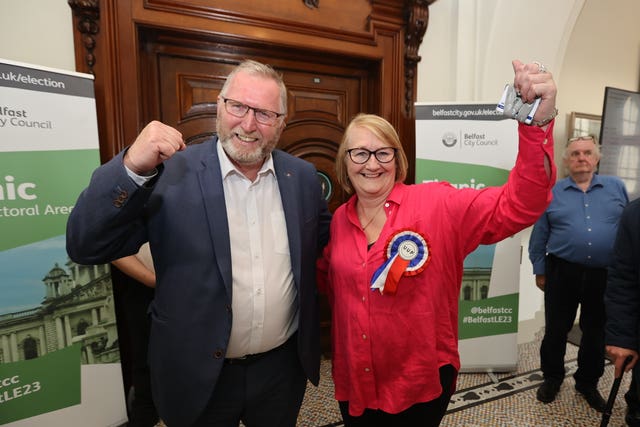Sinn Fein vice president Michelle O’Neill has hailed a “momentous” election result with her party becoming the largest in councils in Northern Ireland.
As the local government elections count neared its conclusion on Saturday evening, the republican party had 139 elected councillors, with gains achieved across the region.
With just a small number of seats outstanding, it means Sinn Fein has replicated its result from last year’s Northern Ireland Assembly election when it became the biggest party at Stormont.
This is an historic election result, with Sinn Féin councillors elected in many areas for the first time.
People have voted for positive leadership, and for a new Assembly that works for all.
The Sinn Féin mandate is stronger than ever, and I give you all my commitment that I… pic.twitter.com/LzyCNdh2zk
— Michelle O’Neill (@moneillsf) May 20, 2023
Ms O’Neill used the latest election victory to repeat her call for the DUP to return to the powersharing institutions at Stormont
The DUP currently has 121 council seats, the Alliance Party 65, the Ulster Unionists 53 and the SDLP 39, with 33 others.
DUP leader Sir Jeffrey Donaldson insisted that his party had polled strongly but said unionism needed to learn lessons from the election.
The turnout for the election was 54%.
Ten of the 11 council areas have now completed their count.
Politics is full of ups and downs, today was special.
Thrilled to be part of a strong DUP team winning 14 seats in total making us the largest party in Ards and North Down Borough Council.
Looking forward to working alongside my colleagues to make a positive difference. pic.twitter.com/st0wX2w1Ql
— Councillor James Cochrane (@jcochrane21) May 20, 2023
Sinn Fein has emerged as the largest party in Mid Ulster, Derry and Strabane, Armagh, Banbridge and Craigavon and Newry, Mourne and Down.
It will also have overall control of Fermanagh and Omagh after winning 21 out of 40 seats.
The DUP will be the largest grouping in Lisburn and Castlereagh, Mid and East Antrim and Ards and North Down.
The unionist party will also have the largest number of councillors in Antrim and Newtownabbey and Causeway Coast and Glens.
The cross-community Alliance Party has made gains and will become the third largest party in local government.
But it has been a disappointing election for the Ulster Unionists and the SDLP.
Veteran PUP councillor Billy Hutchinson became the second party leader to lose his seat in Belfast, following Green Party NI leader Mal O’Hara’s failure to get elected.
The votes are being counted through the single transferable vote system, with 462 seats to be filled across 11 council areas.
The general pattern around voter turnout appeared to be up slightly in areas which would be regarded as predominantly nationalist/republican and down slightly in areas viewed as unionist majority.

Sinn Fein’s Stormont leader Michelle O’Neill described the results as “momentous”.
She said: “Sinn Fein went into this campaign with a positive message of wanting to make politics work for all.
“This election was an opportunity to send a clear signal.
“To support the positive leadership and a party that wants to get the Assembly up and running, deliver first class council services, support people with the cost-of-living crisis, and invest in the health service.
“The voters have now spoken.”
Ms O’Neill said the boycott of the Stormont Assembly by the DUP “cannot go on”.
She said: “The onus is now on the British and Irish Governments to get together and focus their efforts on the immediate restoration of the Executive and Assembly.
“We expect to see an early meeting of the British Irish Intergovernmental Conference.
“The boycott of the Assembly cannot go on and an Executive must be formed.”

“We have made gains in a number of councils.
“The DUP has polled strongly in this election despite everything that’s been thrown at us, despite the challenges we’ve faced, the DUP vote has held up well.”
He put the rise in the Sinn Fein vote down to the “collapse of the SDLP”.
Sir Jeffrey added: “I think if truth be told, there are lessons to be learned for unionism in its broadest sense.
“We need to do better.
“The DUP has had a good election but unionism needs to do better, we need to be winning more seats.
“I’m happy to sit down with my fellow unionists and examine these issues and how greater co-operation can lead a pathway towards more success for unionism in general.”

“I made it quite clear that the party elected me and I am the party leader, and I am going absolutely nowhere. It’ll be the party that decides my fate my one or the other,” he said.
“But I’ll say this, and it’s important to say this: you cannot change direction, and have it all done in the two years that I have been the party leader. It’ll take at least two election cycles.
“We’re in the middle of one election cycle, we’ve got Westminster next year, and that’ll be important also.
“But it’s going to take longer to turn this around, and I’m in this for the long haul, I’m going absolutely nowhere.
“So those people who are a little bit shaky because we’ve had a bad election, they can stay shaky because I’m on absolutely rock solid foundations and I’m going nowhere.”

“It has been very clear when we have been speaking to people that people are really annoyed at the DUP, that they want the executive back up and running and they wanted to send a message.
“Sinn Fein asked them to send that message, and they sent it.
“They (Sinn Fein) have totally cannibalised much of the nationalist electorate.
“They were given a good hand and, to be fair, they played it very well, they ran a very good campaign and they deserve the victory they have today.
“Of course the DUP had as their first priority in their election literature to get back to Stormont – let’s see them put their money where their mouth is.”
Northern Ireland’s councils are responsible for setting rates, planning and waste collection as well as leisure services and parks.






